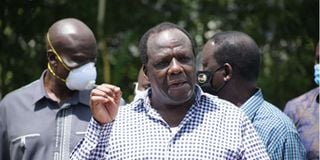Premium
CS Yatani to governors: Spend ‘idle’ cash

Council of Governors and Kakamega Governor Wycliffe Oparanya addresses the press at Ciala Resort in Kisumu County on November 15, 2020.
What you need to know:
- Cabinet Secretary Ukur Yatani said the money, which governors say is for ongoing projects, can be spent since the devolved units “will get more resources soon”.
- The county bosses in September threatened to shut hospitals and send staff home in efforts to push the Senate pass the law guiding the sharing of revenue.
The Treasury has asked county governments to spend the Sh34.6 billion lying in Central Bank of Kenya accounts as the government looks for ways of disbursing the delayed revenue.
Cabinet Secretary Ukur Yatani said the money, which governors say is for ongoing projects, can be spent since the devolved units “will get more resources soon”.
Mr Yatani added that counties should not feel constrained when there is cash in their accounts.
“Use it as we make arrangements to disburse more. Every county has an average of Sh1 million,” he said.
“Even if the money has been earmarked for projects, counties can spend it on priority basis and use future disbursements to fund ongoing projects.”
Governors have been complaining about delays in disbursement of funds by the National Treasure for many months.
The county bosses in September threatened to shut hospitals and send staff home in efforts to push the Senate pass the law guiding the sharing of revenue.
Desperate moves
Council of Governors chairman Wycliffe Oparanya said top county officials have resorted to making arrangements with banks and other financial institutions in order to pay employees.
Treasury says the budget shortfall is as a result of the Covid-19 pandemic, which has led to a sharp fall in revenue.
It cites low economic activity, job and income losses as well as tax relief measures offered by to cushion Kenyans against the effects of the pandemic.
Collections fell by 15.03 per cent, or Sh33.27 billion, in the first two months of this financial year to Sh188.08 billion.
The minister said the measures led to money being disbursed on priority basis.
He added that the government feels it is prudent to use the idle cash before asking for more.
Treasury says it has wired Sh133 billion to county governments in the current financial year, which is about 36 per cent of the Sh369.87 equitable and conditional allocations.
Pandemic effects
The pandemic pushed Kenya into more financial troubles as the country continued paying its huge loans even when revenues plunged.
Kenya needs to collect more revenue from taxes, reduce debt servicing and increase and exports for its economy to recover from the effects of the Covid-19 pandemic.
Mr Yatani and Treasury officials hope the return of income and value added tax to the pre-pandemic rates will reverse the trend of falling revenue.
Treasury also introduced a digital tax and a minimum tax that will see companies remitting one per cent of their gross turnover every month to the government.
The new tax will be applied indiscriminately, whether the companies are making profit or not.
It is a decision that has been heavily criticised by the business community.
Debt waiver
The government is eyeing an additional Sh40.6 billion debt waiver from non G20 nations even as the Paris Club of countries handed it a Sh32.9 billion loan repayment break to use money to tackle the pandemic and its effects.
The International Monetary Fund (IMF) said Kenya could skip budget cuts this year and channel the money into health care and support the economy before cutting spending in future budgets.
“We recommend a pause in fiscal adjustment this financial year to accommodate increased health spending and support for the economy,” said Gerry Rice of the communications department at the IMF on Thursday.
"As we move beyond the crisis, it will be critical that Kenyan authorities resume the pursuit of fiscal sustainability and adjustment”





